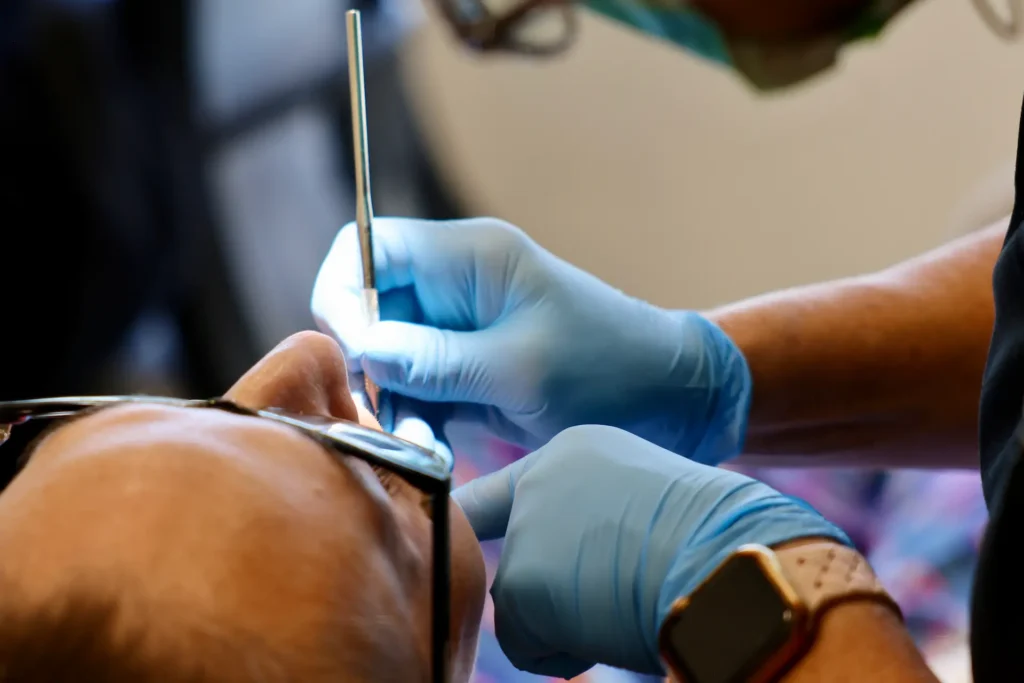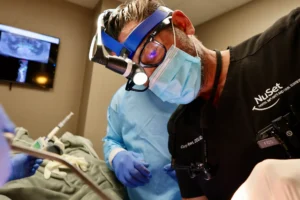When considering dental implants as a solution for missing teeth, it’s natural to have questions about their lifespan and durability. Investing in your oral health is a significant decision, and understanding the longevity of dental implants is vital for ensuring that the results are long-lasting.
Let’s explore how long dental implants last, the various factors influencing their lifespan, why they may fail, the necessary maintenance, and the technological advancements that enhance their success rate.
How Long Do Dental Implants Last?
Dental implants are designed to be a lasting solution with a 90-95% success rate as they directly bond with the jawbone. This bonding process, known as osseointegration, allows the implant material and the adjacent bone tissue to integrate fully.
Once osseointegration is completed, the implant and bone become a unified structure. This fusion enables the implant to act as a stable root for your new tooth, providing a strong base.
Though the implant is meant to be permanent, studies have shown that the crown fitted on top might require replacement within 15 to 20 years due to wear and tear.
Factors That Determine the Longevity of Dental Implants
The success and longevity of dental implants are influenced by several critical factors. Here are some of the factors that determine the durability of your implants:
Quality of Implant Material
The material used in the implant plays a significant role in its durability. Titanium is the most commonly used material due to its strength, biocompatibility, and ability to integrate well with bone tissue. The higher the quality of the titanium, the better the implant’s performance and longevity.
Skill and Experience of the Dental Surgeon
The expertise of the surgeon who places the implant is crucial. A skilled and experienced dental surgeon can ensure the implant is placed correctly, minimizing risks and promoting long-term success. Proper placement affects how well the implant integrates with the jawbone and how it withstands daily use.

Density and Health of the Jawbone
The density and health of your jawbone are significant factors in determining the longevity of dental implants. A strong and healthy jawbone provides a solid foundation for implant integration and stability. Through a comprehensive examination and imaging, your oral surgeon will assess the density and health of your jawbone to ensure that you get an implant treatment plan best suited for you. In cases where the jawbone lacks density or has underlying issues, additional procedures, such as bone grafting, may be recommended to enhance implant success.
Maintenance and Care by the Patient
Post-implantation care is vital for the implant’s longevity. This includes regular brushing, flossing, and using antiseptic mouthwash to prevent infections such as peri-implantitis, which can weaken the surrounding bone and tissue. Regular dental checkups are also essential for monitoring the implant’s health and that of the surrounding area.
Lifestyle Factors
Smoking, poor diet, and certain health conditions like diabetes, high blood pressure, bleeding disorder, congestive heart failure, etc can negatively impact the longevity of dental implants. Smoking, in particular, can impede healing and affect the osseointegration process, increasing the risk of implant failure. A healthy lifestyle supports overall oral health, contributing to the success of dental implants.
Oral Hygiene Practices
Consistent and proper oral hygiene practices are crucial. Implants need to be cleaned as thoroughly as natural teeth to prevent plaque buildup and gum disease, which can lead to implant failure if not addressed.
By considering these factors, you can make informed decisions about dental implants and take appropriate steps to ensure longevity. Working closely with a dental professional can help address any potential issues before they become problematic, ensuring that dental implants remain a lasting solution for missing teeth.
Average Lifespan of Dental Implants
Dental implants are renowned for their durability and are considered one of the most long-lasting solutions for missing teeth. On average, dental implants have the potential to last between 25 to 30 years, with many lasting a lifetime under optimal conditions. This impressive lifespan sets dental implants apart from other tooth replacement options, often requiring more frequent adjustments or replacements.
The longevity of a dental implant primarily depends on how well it integrates with the jawbone, a process influenced by the quality of the implant, the health of the bone, and the expertise of the dental professional performing the procedure. Once fully integrated, the implant serves as a robust and stable foundation for the attached crown, bridge, or denture.
It’s important to note that while the titanium post (the actual implant) can last for decades, the prosthetic component (such as the crown) attached to the implant may wear out more quickly and, depending on factors such as the material used and the patient’s oral habits, could require replacement every 10 to 15 years.
Factors influencing the need for replacement of the final restoration include:
- Wear and Tear: Chewing and biting exert pressure on the crown, which can cause wear over time.
- Oral Hygiene: Good oral hygiene practices can extend the life of the crown, while poor habits can lead to decay and damage.
- Material: The durability of the crown also depends on the material it’s made from, with some materials being more resistant to wear than others.
How to Maximize the Lifespan of Your Dental Implants
To ensure your dental implants last as long as possible, follow these guidelines:
- Brush twice daily and floss daily using a soft-bristled brush and fluoride toothpaste.
- Visit your dentist for check-ups and professional cleanings every 3 to 6 months.
- Avoid smoking, which impairs healing and osseointegration.
- Don’t chew hard foods or use your teeth as tools to prevent damage.
- Eat a balanced diet rich in calcium, vitamin D, and phosphorus to support bone health.
- Wear a mouthguard if you grind your teeth at night to protect against wear and tear.
- Follow post-operative care instructions closely after surgery for optimal healing.
Signs That Your Dental Implants May Need Attention
Monitoring the condition of your dental implants is crucial for their longevity. Here are signs that suggest your implants may require professional evaluation:
- If the implant feels wobbly or shifts, it may not be properly integrated with the bone.
- Persistent or new pain around the implant area could indicate an infection or inflammation.
- Any changes in gum appearance, such as swelling near the implant, can be a sign of infection.
- While occasional bleeding might occur, consistent bleeding around the implant is a concern.
- The implant may need adjustment if it becomes uncomfortable to chew or if you experience pain during biting.
- An unpleasant taste or persistent bad odor emanating from the implant site could indicate an infection.
- If any part of the metal implant becomes visible, it may be a sign that the gum tissue has receded or the implant is failing.
Promptly consulting your dentist upon noticing these signs can prevent further complications and help maintain the health and functionality of your dental implants.
The Role of Technology in Enhancing the Longevity of Dental Implants
The evolution of technology plays a pivotal role in improving dental implant procedures, and this directly impacts their success rates and longevity. Key technological advancements include
Improved Implant Materials
Modern implants are made from high-grade titanium and zirconia, known for their strength, durability, and biocompatibility. These advancements in materials help ensure that implants are more corrosion-resistant and can better integrate with the jawbone.
Digital Imaging and 3D Scanning
Sophisticated imaging techniques such as CBCT (Cone Beam Computed Tomography) provide detailed 3D images of the jawbone. This allows for precise implant placement planning, ensuring optimal positioning and minimizing the risk of complications.
Computer-Aided Design (CAD) and Manufacturing (CAM)
These technologies enable the custom design and fabrication of dental implants and prosthetics. By using CAD/CAM, dental professionals can create more accurate and personalized implant components, improving fit and function.
Guided Surgery Software
Implant placement can now be planned virtually using specialized software. This allows for minimally invasive procedures with guided surgical templates, reducing recovery time and improving the implant’s overall success rate.
Surface Technology
Advances in surface engineering have led to implants with specially treated surfaces that promote faster and stronger bone integration. This enhances the implant’s stability and contributes to its longevity.
Regenerative Techniques
Using bone grafts and growth factors to enhance bone regeneration around the implant site has improved the success of implants in patients with bone loss, making dental implants accessible to a broader range of patients.
By leveraging these technological advancements, dental professionals can offer more reliable, long-lasting dental implants. Patients benefit from procedures that are more predictable, efficient, and tailored to their individual needs, ensuring that their dental implants provide a dependable and aesthetically pleasing solution for missing teeth for years to come.
Get Expert Advice For Your Dental Health
Choosing quality dental implants and professional dental services is vital for long-term success. Taking care of your oral health and keeping regular dental visits are key to ensuring your implants last. If you’re considering dental implants, scheduling a consultation with a dental professional can provide you with personalized advice and information.

At NuSet, we specialize in dental implants, offering expert care and guidance to help you achieve the best results. We’re proud of our success stories in restoring smiles and confidence through dental implants. Regular maintenance and care are crucial for the longevity of your implants, and we’re here to support you every step of the way.
Contact us today for a personalized solution to your dental health.
Frequently Asked Questions
What is the downside of dental implants?
The main downside is the initial cost and the process, which can be lengthy and require several visits to the dentist. However, the long-term benefits often outweigh these factors.
How often do teeth implants need to be replaced?
If properly maintained, dental implants may not need to be replaced and can last a lifetime.
Will dental implants last a lifetime?
Yes, dental implants have the potential to last a lifetime with proper care and maintenance, including good oral hygiene practices and regular dental check-ups. The success of an implant also depends on healthy lifestyle choices, such as not smoking.
What happens after 25 years of a dental implant?
After 25 years, a well-maintained dental implant could still be in excellent condition. The longevity of the implant depends on continuous care and avoiding factors that could compromise its stability, such as gum disease or bone loss. Regular dental visits are crucial to monitor and address any potential issues, ensuring the implant remains secure and functional.





